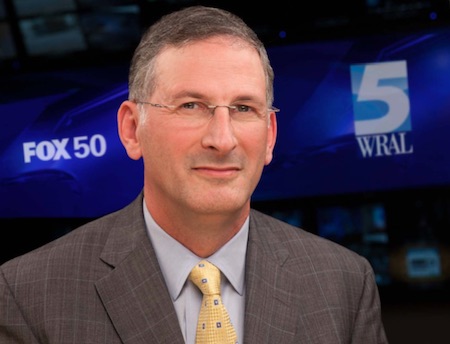Journalism Roots Feed Raleigh Leader’s Growth

The smarter way to stay on top of broadcasting and cable industry. Sign up below
You are now subscribed
Your newsletter sign-up was successful
Related: B&C's Station Group, GMs, News Director and Multiplatform Broadcaster of the Year
Steve Hammel, Wral VP and general manager, has one pet peeve, according to his news director Rick Gall: He doesn’t like when people refer to a newscast as a “show.”
“He’s producing newscasts, not entertainment shows,” Gall says. “He lives and breathes news. If you’re doing news, it’s news, it’s not a show.”
Hammel did not come up through sales the way many general managers do.
“I’m not a former journalist; I’m a journalist,” he says. “It’s in my blood.”
Consolidation was the rule in 2015—big groups pairing up with other big groups with few little guys remaining, and those who do struggling to survive. Yet, here’s a small group and its flagship station that had an outstanding year.
At the helm of the Capitol Broadcasting Company-owned CBS affiliate in Raleigh, N.C. since November 2008, Hammel took over CBC’s Fox affiliate WRAZ this year and added a 4 p.m. newscast; between the two stations, they produce 9.5 hours of news a day. Contrary to industry trends, ratings for WRAL’s weekday newscast are up over the last three years.
The smarter way to stay on top of broadcasting and cable industry. Sign up below
Hammel, 60, began his broadcasting career when his mother took his Cub Scouts group to the local radio station in Pottsville, in eastern Pennsylvania, and Hammel saw a machine spooling out news. After graduating from Syracuse, he returned home for a full-time job in radio, later transitioned into TV and always maintained his passion for journalism.
WRAL is the rare station with a documentary unit. The station airs around seven documentaries a year, usually at 7 p.m. out of the evening news.
The top-rated station in Raleigh, WRAL added a flurry of recognition this year to its list of honors, including Outstanding News Operation at the North Carolina Associated Press Awards for the eighth time in 10 years. Being the market leader and a locally owned station allows WRAL to do big projects like docs, and Hammel works in conjunction with CBC’s other assets in the market—radio stations, digital properties, the Durham Bulls minor league baseball team and part of the Carolina Hurricanes NHL team—to leverage opportunities. “Because of the ratings and revenue combination, we’re able to make sure we can do these types of things,” Hammel says. “We do really important journalism because viewers reward us and expect that from us.”
Hammel is integral to the many editorial projects. “He’s part of the process really from start to finish,” Gall says.
For a 2015 documentary on climate change, the station sent its chief meteorologist and a photographer to a research lab in Point Barrow, Alaska. The documentary won a first-place RTDNAC award.
“We think that while newscasts are there to inform people, a long story in a newscast is two or three minutes,” Hammel says. “Some serious topics important to viewers deserve a lot more than that.”
For every project, report and newscast, Hammel prefers to be “intellectually persuasive” rather than telling people what to do. “If people have that understanding of the end goal, then the end goal will be of higher quality,” he says.
When Hammel first arrived at the station, he met with everyone on staff and learned as much as he could about every person. He still meets with every new employee.
“Steve is all in,” Gall says. “That genuine commitment and care really permeates all that he does and how he conducts himself every day.”
